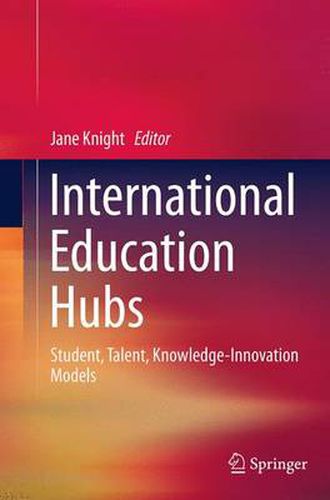Readings Newsletter
Become a Readings Member to make your shopping experience even easier.
Sign in or sign up for free!
You’re not far away from qualifying for FREE standard shipping within Australia
You’ve qualified for FREE standard shipping within Australia
The cart is loading…






This title is printed to order. This book may have been self-published. If so, we cannot guarantee the quality of the content. In the main most books will have gone through the editing process however some may not. We therefore suggest that you be aware of this before ordering this book. If in doubt check either the author or publisher’s details as we are unable to accept any returns unless they are faulty. Please contact us if you have any questions.
Education hubs are the newest development in the international higher education landscape. Countries, zones and cities are trying to position themselves as reputed centres for higher education and research.
But given higher education’s current preoccupation with competitiveness, branding, and economic benefits are education hubs merely a fad, a branding exercise, or are they an important innovation worthy of serious investment and attention? This book tries to answer the question through a systematic and comparative analysis of the rationales, actors, policies, plans and accomplishments for six serious country level education hubs - United Arab Emirates, Qatar, Malaysia, Hong Kong, Singapore and Botswana .
The in-depth case studies shows that one size does not fit all . A variety of factors drive countries to prepare and position themselves as an education hub. They include income generation, soft power, modernization of domestic tertiary education sector, economic competitiveness, need for trained work force, and most importantly a desire to move towards a knowledge or service based economy. In response to these different motivations, three different types of education hubs are being developed: the student hub, talent hub, and knowledge/innovation hub.
Scholars, policy makers, professionals, students and senior decision makers from education, economics, geography, public policy, trade, migration will find that this book challenges some assumptions about crossborder education and provides new insights and information.
$9.00 standard shipping within Australia
FREE standard shipping within Australia for orders over $100.00
Express & International shipping calculated at checkout
This title is printed to order. This book may have been self-published. If so, we cannot guarantee the quality of the content. In the main most books will have gone through the editing process however some may not. We therefore suggest that you be aware of this before ordering this book. If in doubt check either the author or publisher’s details as we are unable to accept any returns unless they are faulty. Please contact us if you have any questions.
Education hubs are the newest development in the international higher education landscape. Countries, zones and cities are trying to position themselves as reputed centres for higher education and research.
But given higher education’s current preoccupation with competitiveness, branding, and economic benefits are education hubs merely a fad, a branding exercise, or are they an important innovation worthy of serious investment and attention? This book tries to answer the question through a systematic and comparative analysis of the rationales, actors, policies, plans and accomplishments for six serious country level education hubs - United Arab Emirates, Qatar, Malaysia, Hong Kong, Singapore and Botswana .
The in-depth case studies shows that one size does not fit all . A variety of factors drive countries to prepare and position themselves as an education hub. They include income generation, soft power, modernization of domestic tertiary education sector, economic competitiveness, need for trained work force, and most importantly a desire to move towards a knowledge or service based economy. In response to these different motivations, three different types of education hubs are being developed: the student hub, talent hub, and knowledge/innovation hub.
Scholars, policy makers, professionals, students and senior decision makers from education, economics, geography, public policy, trade, migration will find that this book challenges some assumptions about crossborder education and provides new insights and information.